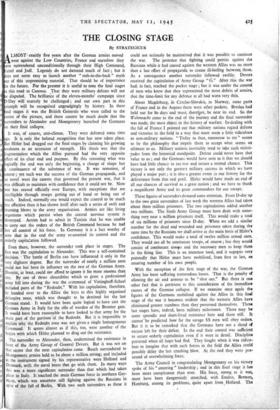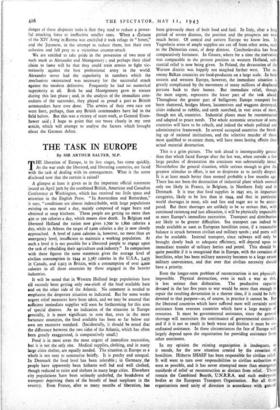THE CLOSING STAGE
By STRATEGICUS LMOST exactly five years after the German armies moved west against the Low Countries, France and ourselves they ave surrendered unconditionally through their High Command, eitel and Jodl. Legends do not demand much of fact ; but it oes not seem easy to launch another " stab-in-the-back " myth t of this unpromising material. That should be of importance or the future. For the present it is useful to note the final stages n this road to Canossa. That they were military defeats will not nt k,
IC
disputed. The brilliance of the eleven-months' campaign since -Day will scarcely be challenged ; and our own part in this iumph will be recognised ungrudgingly by history. In these nal stages it was the British Generals who were called to the entre of the picture, and there cannot be much doubt that the urrenders to Alexander and Montgomery launched the Germans n their final collapse.
It was, of course, anti-climax. They were defeated some time go. It is only the belated recognition that has now taken place. t Hitler had dragged out the final stages by claiming his growing vealcness as an accession of strength. His thesis was that the ragmentation which the Allies pursued had the very apposite ffeet of its clear end and purpose. By this reasoning what was 5 logically the end was only the beginning, a change of shape but -d continuance of the substance of war. It was nonsense, of ourse ; yet such was the success of the German propaganda, and so novel were the canons that governed ihe present war, that it 31 was difficult to maintain with confidence that it could not be. Now war has ceased officially over Europe, with exceptions that are
intelligible through troops getting out of hand or being out of
touch. Indeed, normally one would expect the control to be much ng less effective than it has shown itself after such a series of swift and of stunning blows to the army organisation. Armies are like living v organisms which persist when the central nervous system is n destroyed. Arnim had to admit in Tunisia that he was unable n, to carry out the orders of the British Command because he had ill lost all control of his force. In Germany it is a fact worthy of ny note that in the end the army re-asserted its control and the at orderly capitulation followed.
Even there, however, the surrender took place in stages. The
first was the capitulation to Alexander. This was a self-contained decision. The battle of Berlin can have influenced it only in the very slightest degree. But the surrender of nearly a million men could not but have its influence on the rest of the German Army. Doenitz, at least, could not afford to ignore it for more reasons than one. By one of those absurdities which so great a professional army fell into during the war the command of Vietinghoff-Scheel included parts of the "Redoubt." With his capitulation, therefore. he handed over to the Allies the keys to this highly organised defensive zone, which was thought to be destined for the last German stand. It would have been quite logical to have cast the German Army in Italy for the role of warden of the Brenner gate. It would have been reasonable to have looked to that army for the sr main part of the garrison of , the Redoubt. But it is impossible to
explain why the Redoubt zone was not given a single homogeneous Command. It seems almost as if this, too, were another of the
bogies with which Hitler planned to drag out the resistance.
is The surrender to Alexander, then, undermined the resistance in front of the Army Group of General Devers. But it was not on that sector that the next capitulation came. Busch surrendered to Montgomery armies held to be about a million.strong; and included in the instrument signed by his representative were Holland and Denmark, with the naval bases that go with them. In many ways this was a more significant surrender than that which had taken place in Italy. It touched the main German force in northern Ger- many, which was somehow still fighting against the Russians in spite of the fall of Berlin. With two such surrenders as these it
could not seriously be maintained that it was possible to continue the war. The pretence that fighting could persist against the Russians while it had ceased against the western Allies was no more than a last effort of propaganda to create ill-feeling between, them. As a consequence another surrender followed swiftly. Devers received the capitulation of Army Group "G." After this the war had, in fact, reached the pocket stage ; but it was under the control of men who knew that they represented the mere debris of armies, that the time-limit for any defence at all had worn very thin.
About Magdeburg, in Czecho-Slovakia, in Norway, some parts of France and in the Aegean there were other pockets. Breslau had held out for 8o days and must, theref2re, be near its end. So the Wehrmacht came to the end of the journey and the final surrender was made, the most abject in the history of warfare. Iwdealing with the fall of France I pointed out that military nations regard defeats and victories in the field in a way that must seem a little ridiculous to non-military nations. " Today to thee, tomorrow to me" seems to be the philosophy that impels them to accept what seems an ultimate to us. Military nations inevitably tend to take such vicissi- tudes from the historical standpoint. Defeat could never have that value to us ; and the Germans would have seen to it that we should have had little chance to rec wer and secure a second chance. This victory is not only the greatest military success in which we have played a major part ; it is also a greater event in our history for the deliverance from that real peril. Hitler would have made an end of all our chances of survival as a great nation ; and we have to thank a magnificent Army and its great commanders for our escape.
These figures of surrenders demand some attention. From D-day up to the two great surrenders of last week the western Allies had taken about three million prisoners. The two capitulations added another two millions. The Sixth Army Group must have dealt with some- thing very near a million prisoners itself. This would make a total of six millions of prisoners since D-day. When we add a similar number for the dead and wounded and prisoners taken during the same time by the Russians we shall arrive at the main basis of Hitler's confidence. This would make a total of twelve million armed men. They would not all be combatant troops, of course ; but they would consist of combatant troops and the necessary men to keep them in the firing line. This is an immense total, and it sugegsts very pointedly that Hitler must have mobilised, from first to last, an amazing number of his own people.
With the exception of the first stage of the war, the German Army has been suffering tremendous losses. That is the penalty of allowing the air and armour to be " shot out." But there is one other fact that is pertinent to this consideraion of the immediate causes of the German collapse. If we examine once again the figures of the Germans mobilised against the Allies in this final stage of the war it becomes evident that the western Allies have eliminated greater numbers than they possessed themselves. These last stages have, indeed, been military milestones. There may be some sporadic and short-lived resistance here and there still. It cannot-be predicted how far the savage SS men will obey orders. But it is to be remarked that the Germans have not a shred of excuse left for their defeat. In the end their control was sufficient to secure orderly capitulation even if it were in detail. Discipline persisted when all hope had fled. They fought when it was ridicu- lous to imagine that with such forces in the field the Allies could possibly delay the last crushing blow. At the end they were pos- sessed of overwhelming force.
The A:my Council in congratulating Montgomery on his victory spoke of his " unerring " leadership ; and in this final stage it has been more conspicuous than ever. His force, strong as it was, must have been dangerously stretched, with Emden, Bremen, Hamburg, among its problems, quite apart from Holland. The
danger of these disparate tasks is that they tend to reduce a power- ful attacking force to ineffective smaller ones. When a division of the XIV Army in Burma was encircled it took refuge in " boxes," and the Japanese, in the attempt to reduce them, lost their own cohesion and fell prey to a victorious counter-attack.
We are entitled to take pride in the possession of two men of such mark as Alexander and Montgomery ; and perhaps their chief claim to fame will be that they could train armies to fight vic- toriously against the best professional army in the world. Alexander never had the superiority in numbers which the mechanists niaintained was necessary for the successful attack against the modern defensive. Frequently he had no numerical superiority at all. Both he and Montgomery grew in stature during this last phase ; and, in the analysis of the immediate ante- cedents of the surrender, they played as proud a part as British commanders have ever done. The armies of their own race roo were finer, perhaps, than any British commanders have led in the field before. But this was a victory of team work, as General Eisen- hower said ; I hope to point that out 'more clearly in my next article, which will attempt to analyse the factors which brought about the German defeat.























 Previous page
Previous page